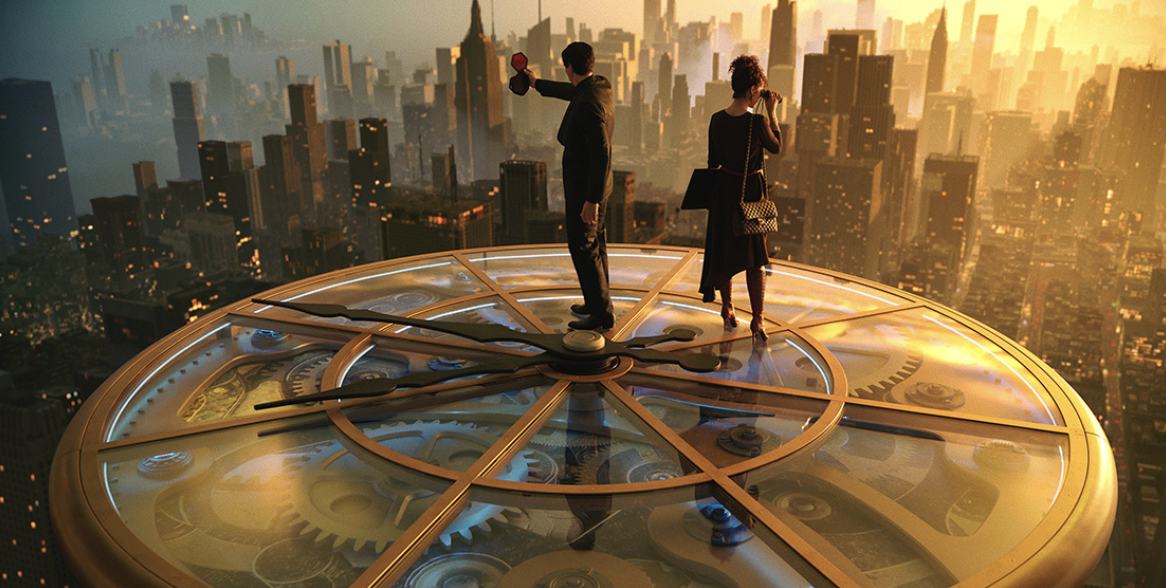Why should we care about Megalopolis?
By Ray Wu
Megalopolis managed to force its way through my cinema firewall mere minutes after its premiere at Cannes earlier this year. Videos of the theatre attendance breaking the fourth-wall and conversing with Adam Driver on-screen flooded my Instagram stories. I stopped myself there and didn’t read the negative reviews coming out of France, so I could feel the film out for myself…
And what a film Megalopolis is. As the credits rolled, I knew I’d just witnessed an absolute mess.
The plot itself is fairly straightforward. Told through the medium of a fable, the story, set in New Rome, is about an eccentric genius named Caesar (Adam Driver) who, with the power to stop time and armed with his invented element Megalon, wagers his fortune and life’s work for a better future. Opposingly, the city’s mayor (Giancarlo Esposito) conflicts with Caesar's need for progress. Megalopolis tries to examine the difficulties of building something great and novel while showing how deeply flawed individuals pushing change can be.
However, the film just opens itself up to be made fun of so easily.
Megalopolis is like the results of putting the notes page on your phone where you collect quotes, locations, ideas, and pop-culture references through an AI video generator, except if your notes collection is filled with misused Greek and Latin quotes, an idea of what a utopia looked like in the 2000s, and a collage of Elon Musk’s future city renders laced in gold. And the $120 million special effects, as X user @century21savage best puts it, look like a Linkin Park music video.
Then, I calmed down. “It's a Francis Ford Coppola film,” I thought to myself, “there has to be something that I am missing.” After all, many of his previous films—including self-funded work like Apocalypse Now and One from the Heart—have a track record of being highly divisive during their release and proved themselves to be the work of a visionary throughout the years. Is this one of these cases?
Having funded the film almost entirely on his own by selling off a portion of his vineyard, Megalopolis is clearly deeply personal for Coppola, a story that he felt he had to tell.
Beneath the plot, the film is a love letter to America and the great values that she is built on. Coppola cares about this country, but one can also tell that he is worried about her. The faux-Joker style inserts of New York City streets and the use of stock footage of terrorism and human tragedies all clearly tell us that the society we live in needs change. But the delivery of the message is where things fall apart for most people. Megalopolis makes no attempt to keep the audience immersed in the narrative. The assortment of quotes from Roman emperors and PowerPoint-looking title cards pauses the narrative and forces you to reflect on what you just saw; along with the aforementioned fourth wall-breaking conversation.
Another source of frustration for the audience, aside from the problematic presentation, is that the film refuses to answer the question it poses. Loose ends and threads from the film’s narrative are unsettled. But more importantly, the questions it set out to explore, like “How will a utopia function in the future?” or “How can we begin to make changes?” are left untouched.
Why? It is because Coppola himself doesn’t even know the answer. The film has been in development since the early 1980s, and production stopped after some brief second-unit filming due to the September 11 attacks. It was not restarted until 2019.
Over the course of forty-plus years, Coppola couldn’t come up with an answer.
Megalopolis merely intends to propose the questions. Like the great leaders and thinkers in Ancient Rome, it aimed to provoke thought in order to get the public thinking about what we wanted for the future. It simply proposes that there is a solution but never claims itself to be one. That is what Coppola tried to achieve in making a film in his eighties.
Unfortunately, that is not what people today will take away from the film. No matter what the film’s intentions are, the end product we see today is uncontrolled. It’s a collection of ideas that drifted apart from cohesiveness over time. There is a loose thread if you choose to follow it, but most of the time, you find yourself fixated on insane dialogues delivered by a confused Nathalie Emmanuel. Coppola’s grip on contemporary society has been fading away, creating a dissonance between his attempt to invoke change and the preachy jumble that the audience received.
Yet, to quote Marcus Aurelius, like the film did, “What we do now echoes in eternity.” Maybe more obsessive changemakers who are willing to commit everything just to send a message are precisely what we need.


